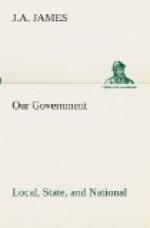Private Property.—Private property shall not be taken for public use except a necessity therefore exists, and then only after just compensation has been paid.
Religion.—The free exercise and enjoyment of religious faith and worship shall forever be guaranteed.
No religious test shall be required for holding public office.
Freedom of Speech and of the Press.—Every person may freely speak, write, and publish on any subject, but he is held responsible for the abuse of that liberty,
Freedom of Meeting.—The people shall have the right to assemble and consult for their common good, and may petition the Legislature for redress of grievances.
Security Against Military Tyranny.—Soldiers shall not be quartered in private houses in times of peace without the consent of the owner, nor in times of war except as the law may provide.
It will be seen from the above that the State government as well as the National is planned on the accepted fact that all power originates with the people. In America the people have the divine right to rule. The people possess all rights which they have not expressly given to the government. The Bill of Rights which we have discussed is therefore a double safeguard which the people have thrown about their sacred inalienable rights.
DEPARTMENTS OF GOVERNMENT.
Government consists essentially in making, judging, and enforcing the laws. In absolute monarchical forms of government, of which Russia and Turkey are examples, these three departments are vested in the same head; but in republics and limited monarchies the law-making, law-judging, and law-enforcing powers are separated. History has proved that the separation of these three powers of government is most satisfactory for an enlightened people.
Legislative Department.—The legislative or law-making power of the State is vested in a Legislature which is composed of a Senate and a House of Representatives. The sessions of the two houses are open to the public and each house keeps a journal of its proceedings in which is recorded the yea and nay votes on any question at the request of any three members.
Qualifications of Members.—The qualifications of a senator or representative in the State of Idaho are the same. He must be a citizen of the United States, an elector of the State, and he must have been an elector for at least one year next preceding his election in the county from which he is chosen.
Sessions.—The Legislature meets biennially at the State Capital, commencing on the first Monday after the first day of January in the odd years. Special sessions of the Legislature may be called by the Governor when he deems it necessary. No special session shall continue for more than twenty days.
The compensation of our legislators is five dollars per day, with an allowance of ten cents per mile going to and returning from the place of meeting.




